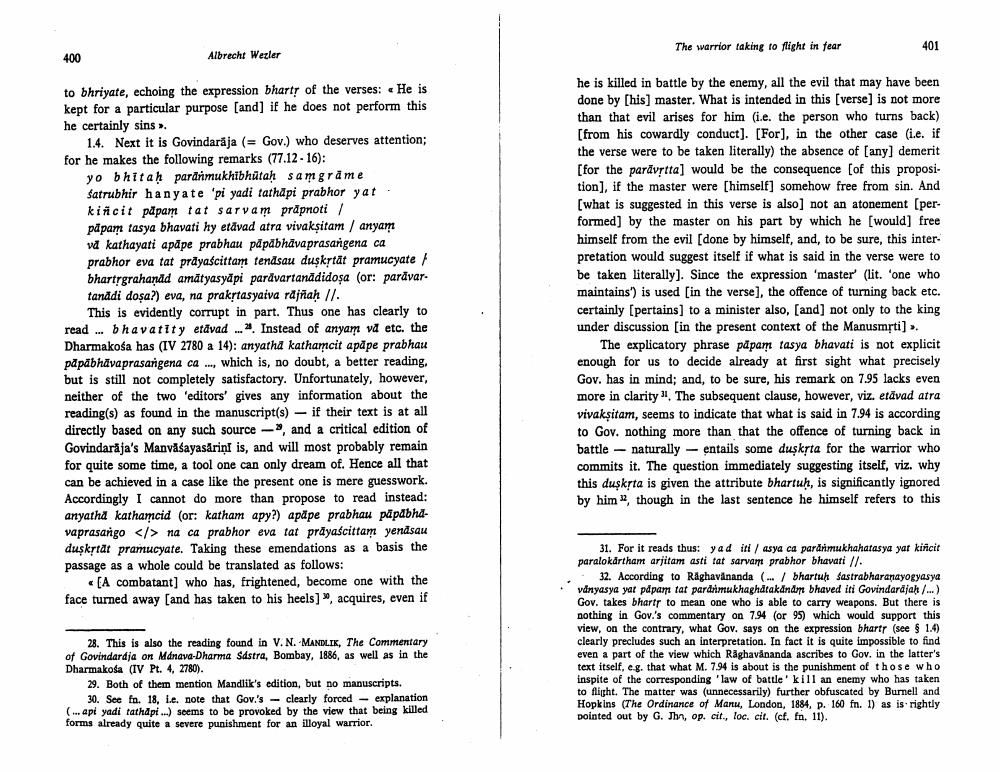________________
The warrior taking to flight in fear
401
400
Albrecht Wezler
to bhriyate, echoing the expression bharts of the verses: He is kept for a particular purpose [and] if he does not perform this he certainly sins.
1.4. Next it is Govindaraja (= Gov.) who deserves attention; for he makes the following remarks (77.12 - 16):
yo bhitaḥ pardrmukhibhūtah samgrame satrubhir hanyate 'pi yadi tathāpi prabhor yat. kincit papam tat sarvam praproti papam tasya bhavati hy etāvad atra vivaksitam / anyam vd kathayati apāpe prabhau papábhavaprasangena ca prabhor eva tat prdyascittam tendsau duskytät pramucyate bhartygrahandd amātyasyapi pardvartanddidosa (or: pardvar tanádi doşa?) eva, na prakrtasyaiva rdjnah //.
This is evidently corrupt in part. Thus one has clearly to read ... bhavatity etavad ... Instead of anyam vd etc. the Dharmakośa has (IV 2780 a 14): anyatha kathamcit apape prabhau papábhavaprasangena ca.... which is, no doubt, a better reading, but is still not completely satisfactory. Unfortunately, however, neither of the two 'editors' gives any information about the reading(s) as found in the manuscript(s)-if their text is at all directly based on any such source , and a critical edition of Govindaraja's Manvāśayasarini is, and will most probably remain for quite some time, a tool one can only dream of. Hence all that can be achieved in a case like the present one is mere guesswork. Accordingly I cannot do more than propose to read instead: anyatha kathamcid (or: katham apy?) apdpe prabhau papábhdvaprasango </> na ca prabhor eve tat prayascittam yendsau
skrtat pramucyate. Taking these emendations as a basis the passage as a whole could be translated as follows:
< [A combatant) who has, frightened, become one with the face turned away (and has taken to his heels] ”, acquires, even if
he is killed in battle by the enemy, all the evil that may have been done by [his] master. What is intended in this [verse] is not more than that evil arises for him (i.e. the person who turns back) [from his cowardly conduct). (For), in the other case (i.e. if the verse were to be taken literally) the absence of (any] demerit (for the pardvętta] would be the consequence (of this proposition), if the master were [himself] somehow free from sin. And [what is suggested in this verse is also] not an atonement (performed) by the master on his part by which he (would) free himself from the evil [done by himself, and, to be sure, this interpretation would suggest itself if what is said in the verse were to be taken literally). Since the expression 'master (lit. 'one who maintains') is used in the verse], the offence of turning back etc. certainly (pertains) to a minister also, [and] not only to the king under discussion (in the present context of the Manusmrti).
The explicatory phrase papam tasya bhavati is not explicit enough for us to decide already at first sight what precisely Gov. has in mind; and, to be sure, his remark on 7.95 lacks even more in clarity". The subsequent clause, however, viz. etävad atra vivaksitam, seems to indicate that what is said in 7.94 is according to Gov. nothing more than that the offence of turning back in battle - naturally - entails some duşksta for the warrior who commits it. The question immediately suggesting itself, viz. why this duskata is given the attribute bhartuḥ, is significantly ignored by him , though in the last sentence he himself refers to this
31. For it reads thus: yad iti / asya ca pardrimukhahatasya yar kiricit paralokartham arjitam asti tat sarvat prabhor bhavati //
32. According to Raghavananda (- / bhartu Sastrabharanayogyasya vdnyasya yat pdpam far pardukhaghatakandip bhaved iti Govindardjah /...) Gov. takes bhartr to mean one who is able to carry weapons. But there is nothing in Gov's commentary on 7.94 (or 95) which would support this view, on the contrary, what Gov. says on the expression bhartt (see $ 1.4) clearly precludes such an interpretation. In fact it is quite impossible to find even a part of the view which Raghavananda ascribes to Gov. in the latter's text itself, eg. that what M. 7.94 is about is the punishment of those who inspite of the corresponding 'law of battle' kill an enemy who has taken to flight. The matter was (unnecessarily) further obfuscated by Burnell and Hopkins (The Ordinance of Manu, London, 1884, p. 160 fn. I) as is rightly pointed out by G. Jhn, op. cit., loc. cit. (cf. fn. 11).
28. This is also the reading found in V. N. MANDLIK, The Commentary of Govindardja on Manava-Dharma Sastra, Bombay, 1886, as well as in the Dharmakośa (IV Pt. 4, 2780).
29. Both of them mention Mandlik's edition, but no manuscripts.
30. See fa. 18, i.e. note that Gov's - clearly forced - explanation (... api yadi tathapi ...) seems to be provoked by the view that being killed forms already quite a severe punishment for an illoyal warrior.




